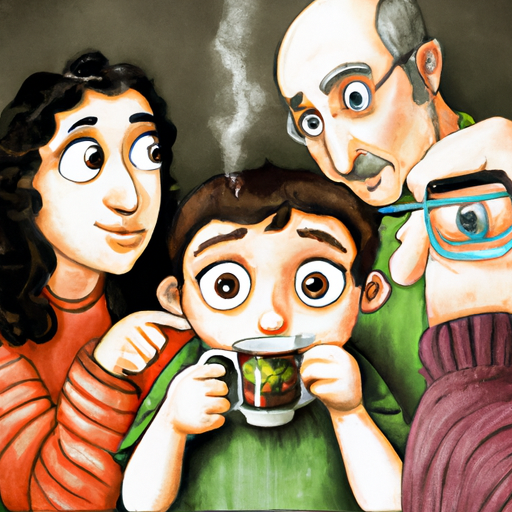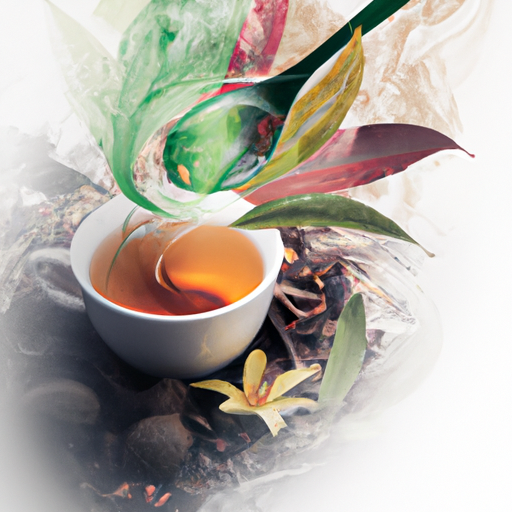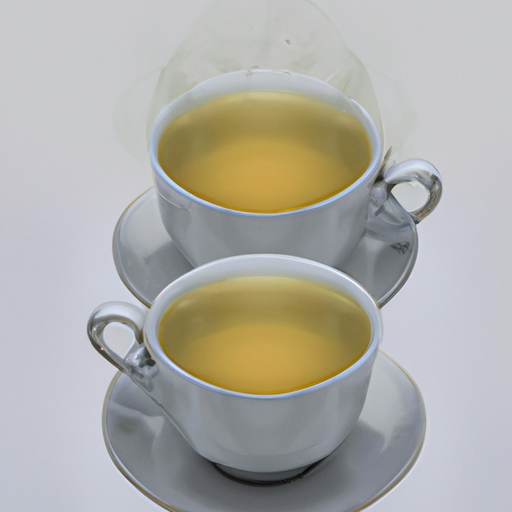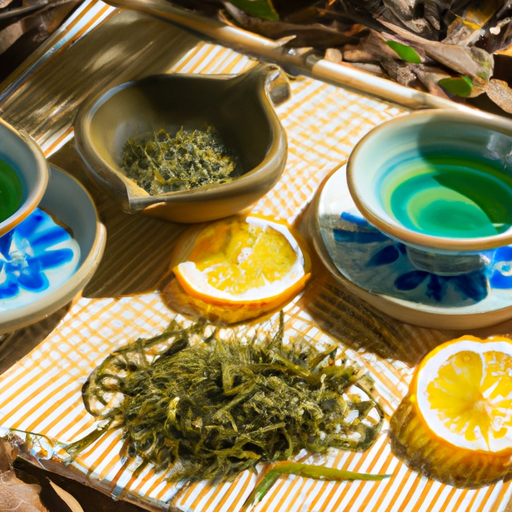As the saying goes, ‘Curiosity killed the cat.’ And when it comes to children, curiosity can often lead them down unexpected paths. One such path may involve accidentally drinking an herbal tea meant for adults. While it might seem harmless, the consequences can be more than just a bitter taste in their mouth.
In this article, we will explore the potential outcomes when a child consumes an herbal tea intended for grown-ups. From the ingredients found in these teas to the risks of caffeine and other stimulants, we will delve into the possible effects on their young bodies.
Additionally, we will discuss the dangers of contamination, digestive issues, allergic reactions, and the potential long-term health effects that may arise.
But fear not, as we will also provide invaluable tips on preventing accidental consumption. So, if you have ever wondered what could happen if your child mistakenly sips on your herbal brew, keep reading to stay informed and ensure their safety.
Key Takeaways
- Drinking herbal tea meant for adults can have consequences beyond a bitter taste, including drowsiness, allergic reactions, and digestive discomfort.
- Adult herbal teas may contain ingredients like caffeine and stimulants that can negatively affect children’s sleep patterns, behavior, and overall health.
- Herbal teas can be contaminated with pesticides, heavy metals, mold, and bacteria, posing additional health risks to children.
- It is important to choose herbal teas specifically formulated for children and consult with a pediatrician before introducing new teas or supplements to ensure their safety.
Understanding the Ingredients in Adult Herbal Teas
Don’t underestimate the power of understanding the ingredients in adult herbal teas – it could mean the difference between safety and danger for your little one. It’s important to educate yourself about the potential benefits and side effects of these ingredients before allowing your child to consume them.
While herbal teas can offer various health benefits, such as boosting immunity or improving digestion, they can also carry risks. Some herbal teas contain ingredients like chamomile or lavender, which are known for their calming effects. These can be beneficial for adults, but they may not be suitable for children, as their bodies react differently. In some cases, these herbs can cause drowsiness or even allergic reactions in young ones.
Other herbs, like peppermint or ginger, can help with digestion or ease nausea in adults, but they may be too strong for a child’s sensitive stomach. Additionally, some adult herbal teas may contain caffeine or other stimulants, which can have negative effects on children. Caffeine can interfere with their sleep patterns, cause irritability, or even increase heart rate and blood pressure.
It’s crucial to be aware of these risks and make informed decisions when it comes to giving herbal teas to children. Understanding the ingredients in adult herbal teas is essential for the safety of your child. Now that we’ve covered the potential benefits and side effects of these ingredients, let’s explore the risks of caffeine and other stimulants.
The Risks of Caffeine and Other Stimulants
You should be aware of the potential risks of giving a child a beverage intended for adults, as it can contain stimulants that may negatively affect their health and well-being. For instance, a child who consumes a caffeinated herbal tea designed for adults may experience increased heart rate and difficulty sleeping, which can disrupt their daily activities and overall development.
Caffeine sensitivity is a crucial consideration when it comes to children consuming adult herbal teas. Children tend to be more sensitive to the effects of caffeine than adults. Even small amounts of caffeine can lead to restlessness, irritability, and even anxiety in children. Additionally, children have a lower tolerance for stimulant overdose, and consuming high amounts of caffeine can cause serious health problems such as rapid heart rate, high blood pressure, and even seizures.
To provide a better understanding, here is a table showcasing the potential risks of giving a child a caffeinated herbal tea designed for adults:
| Potential Risks |
|---|
| Increased heart rate |
| Difficulty sleeping |
| Restlessness |
| Irritability |
| Anxiety |
| Rapid heart rate |
| High blood pressure |
| Seizures |
It is crucial to prioritize the well-being of children and avoid exposing them to unnecessary risks. In the next section, we will explore another potential concern related to herbal teas: contamination.
Herbal Tea Contamination
When it comes to herbal tea, it’s important to be aware of potential contamination risks. Pesticides and chemical residues can find their way into the tea leaves, causing potential harm when consumed.
Additionally, heavy metals and toxins may be present, posing a health risk if consumed in large amounts.
Lastly, mold and bacterial growth can occur if the tea is not properly stored, leading to potential illness.
It’s crucial to be knowledgeable about these risks and take precautions when choosing and preparing herbal tea.
Pesticides and Chemical Residues
Beware of the potential dangers lurking in herbal teas made for adults, especially when it comes to pesticides and chemical residues. Pesticide exposure can be harmful to anyone, but children are particularly vulnerable due to their smaller size and developing bodies. These teas may contain pesticides that have been used during the cultivation process, and these residues can pose a risk to children’s health.
Additionally, some herbal teas may contain chemicals that are toxic when consumed in high amounts. It’s important for parents to be aware of the potential risks and to carefully read the labels and ingredients of herbal teas before giving them to their children. By doing so, they can help minimize the chances of pesticide exposure and chemical toxicity.
Moving on to the next section about heavy metals and toxins, it’s important to consider the potential risks associated with these substances as well.
Heavy Metals and Toxins
Also, it’s crucial to be aware of the presence of heavy metals and toxins in herbal teas. Can we really trust that the teas we give our children are free from these harmful substances? Heavy metals like lead, arsenic, and cadmium can contaminate herbal teas through soil or water pollution during cultivation. These toxins pose serious health risks, especially for children, as their bodies are still developing. To ensure the safety of herbal teas, it is important to choose brands that prioritize heavy metals awareness and conduct rigorous testing for contaminants. Additionally, detoxification methods such as chelation therapy can help remove heavy metals from the body. By staying informed and taking necessary precautions, we can protect our children from the potential dangers associated with heavy metal exposure in herbal teas. Moving on to the next topic, let’s discuss the issue of mold and bacterial growth.
Mold and Bacterial Growth
Mold and bacterial growth can potentially contaminate herbal teas, posing health risks to consumers, especially those with weakened immune systems. To prevent mold, it’s important to store herbal teas in a cool, dry place away from sunlight and moisture.
If you notice any signs of mold, such as a musty smell or visible growth, it’s best to discard the tea and not consume it. Bacterial contamination can occur if the tea leaves or the preparation equipment aren’t properly cleaned. It’s crucial to wash your hands before handling tea leaves and to clean all utensils and equipment thoroughly.
Additionally, using boiled water and steeping the tea for the recommended time can help minimize the risk of bacterial growth.
Transitioning into the next section, digestive issues and an upset stomach can be a result of consuming contaminated herbal teas.
Digestive Issues and Upset Stomach
If you sip on that adult herbal tea, your tummy might start doing somersaults and feel like a rollercoaster ride. Digestive discomfort can be a common side effect when a child drinks an herbal tea made for adults. While herbal teas can have many health benefits for adults, they may not be suitable for children due to their sensitive digestive systems.
Children’s digestive systems are still developing and may not be able to handle the strong herbs and ingredients found in adult herbal teas. This can lead to digestive issues and upset stomachs. The herbal compounds in these teas can cause irritation and inflammation in the digestive tract, resulting in discomfort and even nausea.
To ensure herbal tea safety for children, it’s important to choose teas specifically formulated for their age group. These teas are typically milder and gentler on their stomachs. Additionally, it’s always a good idea to consult with a pediatrician before introducing any new herbal teas or supplements to a child’s diet.
Moving on to the next topic of allergic reactions, it’s important to be aware that children can also have allergic reactions to certain herbs found in adult herbal teas. These reactions can range from mild to severe and may include symptoms such as itching, hives, or difficulty breathing.
Allergic Reactions
When it comes to herbal teas, it’s important to be aware of common allergens that can be found in them. Some common allergens in herbal teas include chamomile, peppermint, and ginger.
Allergic reactions can range in severity, with symptoms ranging from mild itching and hives to more severe symptoms like difficulty breathing and swelling of the throat. In rare cases, anaphylaxis can occur, which is a life-threatening allergic reaction that requires immediate medical attention.
Common Allergens in Herbal Teas
One potential concern with herbal teas made for adults is that they may contain common allergens that could be harmful to children. It’s important to be aware of these potential health risks if considering giving herbal tea to a child.
Some common allergens found in herbal teas include:
-
Tree nuts: These can include almonds, walnuts, and cashews. Children with nut allergies should avoid herbal teas that contain these ingredients.
-
Soy: Many herbal teas contain soy-based ingredients, which can be a problem for children with soy allergies.
-
Gluten: Some herbal teas may contain gluten, which can be harmful to children with gluten sensitivities.
It’s crucial to carefully read the ingredients list on the packaging of herbal teas to ensure that they are safe for children to consume. Understanding the potential allergens in herbal teas can help prevent adverse reactions in children.
Moving on to the next section, it’s important to know the symptoms and severity of allergic reactions.
Symptoms and Severity of Allergic Reactions
Understanding the symptoms and severity of allergic reactions is crucial when it comes to herbal tea consumption. Allergic reactions can range from mild to severe, depending on the individual and the specific allergen.
Some common allergens found in herbal teas include chamomile, peppermint, and ginger. Symptoms of an allergic reaction can include itching, hives, swelling, and difficulty breathing. In more severe cases, anaphylaxis can occur, which is a life-threatening allergic reaction that requires immediate medical attention.
It is important to be aware of the potential allergens in herbal teas and to closely monitor any symptoms that may arise after consumption. If an allergic reaction occurs, it’s essential to seek emergency medical help promptly.
Moving on to anaphylaxis and emergency situations, it’s important to know how to respond swiftly in these critical instances.
Anaphylaxis and Emergency Situations
Moving on from discussing the symptoms and severity of allergic reactions, it’s crucial to understand the potential dangers of anaphylaxis and how to effectively manage it in emergency situations.
Anaphylaxis is a severe allergic reaction that can occur when a child consumes a herbal tea made for adults. It’s a life-threatening condition that requires immediate medical attention.
If a child experiences symptoms such as difficulty breathing, swelling of the throat, or a rapid heartbeat, it’s essential to call emergency services right away. While waiting for help to arrive, it’s recommended to administer an epinephrine auto-injector if available, and to help the child lie down with their legs raised.
After the initial emergency response, it’s important to seek medical follow-up and discuss any long-term health effects that may arise from the incident.
Long-Term Health Effects
When it comes to the long-term health effects of children consuming herbal tea made for adults, there are several key points to consider.
First and foremost, it’s important to recognize the potential impact on children’s growth and development. The herbal ingredients in adult teas may not be suitable for young bodies, potentially hindering their growth and development.
Additionally, hormonal imbalances can occur as a result of children consuming these teas, which could have long-lasting effects on their overall health and well-being.
Lastly, there is a concern for potential risks to organ systems, as the herbal ingredients may not be metabolized properly by young bodies, leading to adverse effects on various organs.
Therefore, it’s crucial to exercise caution and ensure that children are consuming age-appropriate beverages to safeguard their long-term health.
Impact on Children’s Growth and Development
Imagine sipping on an herbal tea made for adults, only to find that it stunts your growth and development like a withering flower in a neglected garden. This scenario is a concern when it comes to children consuming herbal teas intended for adults.
While herbal teas are generally considered safe, it is important to note that children have different physiological needs and tolerances compared to adults. Children with underlying health conditions may be more susceptible to adverse effects from herbal teas. Additionally, the impact on cognitive development is a significant consideration. Some herbal teas contain compounds that may interfere with brain development in children.
It is crucial for parents and caregivers to exercise caution and consult with healthcare professionals before allowing children to consume herbal teas meant for adults. Doing so can help prevent potential negative consequences and ensure the optimal growth and development of children.
Transitioning into the next section, hormonal imbalances can also arise from the consumption of inappropriate herbal teas.
Hormonal Imbalances
To fully grasp the potential risks of consuming herbal teas not meant for you, picture yourself caught in the tangled web of hormonal imbalances. Hormonal changes are a delicate process in children, as their bodies are still developing and growing. Consuming herbal teas made for adults can disrupt these hormonal changes and lead to imbalances that can have long-term developmental effects.
Here are three important things to consider:
-
Estrogen and testosterone levels: Herbal teas designed for adults may contain ingredients that can alter the levels of estrogen and testosterone in children. This can affect their physical and sexual development.
-
Growth hormones: Herbal teas not meant for children may interfere with the production and regulation of growth hormones. This can potentially hinder their overall growth and development.
-
Thyroid function: Some herbal teas can impact thyroid function, which is crucial for proper metabolism and growth. Disruptions in thyroid function can have far-reaching effects on a child’s development.
Understanding the potential risks to organ systems, it’s essential to exercise caution when considering herbal teas for children.
Potential Risks to Organ Systems
Consider the potential risks to your child’s organ systems and the long-term developmental effects that can arise from consuming herbal teas not intended for their age group.
Herbal teas made for adults may contain ingredients that can have adverse effects on a child’s organs, such as the liver and kidneys. These organs are still developing and may not be able to efficiently process certain compounds found in adult herbal teas.
Additionally, some herbal teas may contain caffeine or other stimulants that can negatively impact a child’s cognitive function, potentially leading to difficulties with concentration and learning.
To prevent accidental consumption and protect your child’s health, it’s crucial to store herbal teas safely out of their reach and educate them about the importance of consuming only age-appropriate beverages.
Preventing Accidental Consumption
Safe sipping starts by securing and storing herbal teas out of a child’s curious reach. Prevention strategies are crucial to ensure that accidental consumption of adult herbal teas does not occur. One effective way to prevent this is by educating children about the potential dangers of consuming teas designed for adults. By having open and honest conversations with them, we can explain why these teas aren’t suitable for their age group.
Additionally, it’s important to emphasize the importance of asking an adult before consuming any type of beverage, especially if it looks unfamiliar.
Another prevention strategy is to keep herbal teas in child-resistant containers or cabinets that are inaccessible to children. This reduces the likelihood of accidental consumption by creating a physical barrier. Furthermore, it’s essential to read and follow the instructions on herbal tea packaging, including any warnings or age restrictions. These guidelines are in place for a reason, and they shouldn’t be overlooked.
Preventing accidental consumption of herbal teas made for adults requires a combination of communication with children and physical barriers. By proactively educating children about the potential risks and storing teas safely, we can minimize the chances of a child drinking an herbal tea meant for adults.
Frequently Asked Questions
Can herbal teas designed for adults be harmful to children?
Yes, herbal teas designed for adults can be harmful to children. Children may have potential allergies to certain ingredients. It is important to explore herbal tea alternatives that are specifically formulated for children to ensure their safety and well-being.
What are the potential risks of caffeine and other stimulants found in adult herbal teas if consumed by a child?
Potential risks of caffeine and other stimulants in adult herbal teas for children include increased heart rate, restlessness, irritability, and difficulty sleeping. These symptoms may occur if a child consumes such teas.
How can herbal tea contamination occur and what are the potential dangers for children?
Potential sources of herbal tea contamination include improper storage, cross-contamination with allergens, and the use of contaminated water or ingredients. To prevent accidental ingestion by children, store adult herbal teas separately and educate them about the importance of drinking age-appropriate beverages.
What digestive issues and upset stomach symptoms can children experience after consuming adult herbal teas?
Children can experience digestive issues and upset stomach symptoms after consuming adult herbal teas. These can include nausea, vomiting, stomach cramps, and diarrhea. It is important to remember that herbal teas made for adults may not be suitable for children.
Are there any long-term health effects that can arise from a child drinking herbal teas meant for adults?
Long-term effects of children drinking adult herbal teas can impact their development. The potency of certain herbs may interfere with their delicate systems, potentially leading to hormonal imbalances or other health issues. It is important to consult a pediatrician before giving them any herbal teas.
Conclusion
Well, folks, we’ve reached the end of our little journey into the world of herbal teas and their potential effects on our little ones. I hope you’ve learned a thing or two about the ingredients, risks, and possible consequences of a child sipping on a cup of adult herbal tea.
Remember, it’s always better to be safe than sorry when it comes to our kids’ health. So, keep those teas out of reach, folks, and let’s avoid any accidental consumption mishaps.
Stay informed, stay cautious, and keep those little ones safe!










